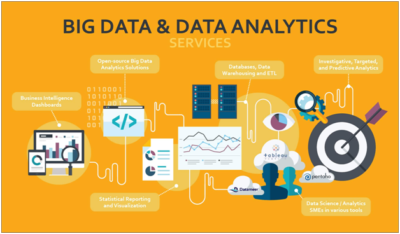WHAT ARE DATA WAREHOUSE, BUSINESS INTELLIGENCE AND DATA SCIENCE?
Let’s first start off with understanding what these concepts are.
What is Data Warehouse?
-
A data warehouse is a subject-oriented, integrated, and time-variant collection of data that supports the decision-making process.
-
Data Warehouse resides on an enterprise mainframe server or increasingly, in the cloud.
-
Data from different online transaction processing applications and other sources is carefully extracted for use by analytical applications and user queries.
-
It is also called as ETL – Extraction, Transformation & Loading.
-
Tools like Abinitio, Informatica Powercenter, Teradata, etc are used for effective Data Warehousing.
What is Business Intelligence?
-
Business intelligence (BI)is used for many applications and processes for the analysis, integration,and it can also be used for demonstration of business information.
-
Business Intelligence gives us historical, current, and predictive views of business operations, most often using data that has been collected into a data warehouse and occasionally working from operational data.
-
Commonly used tools are Qlik View, Sales Force, Power BI, etc,.
What is data science?
-
Data science is an integrative combination of data inference, algorithm development, and technology in order to solve analytically complex problems.
-
With the help of data science, companies are employing big data to bring value to its consumers.
-
Currently trending tools in market are R Programming, Python, SAAS, Tableau.
-
For example, Banking institutions are capitalizing on big data to enhance their fraud detection successfully.
Difference between Data Warehousing, Business Intelligence and Data Science
1. VIEWPOINT
Data Warehousing stores data, which may be physical or logical.
Business Intelligence(BI) systems are designed to look backward based on real data from real events.
Data Science looks forward, interpreting and analyzing the information to think about what might happen in the future with logical predictive and statistical modelling.
2. TARGET
Business Intelligence (BI)gives thorough reports about key indicators and trends but it does not predict what this data may look like in the future in the form of reports or an infographics.
Data Science does the prediction for us with a statistical report.
Data warehousing captures data, but does not start from the point-of-view of the user.
3. DATA SOURCE API
Business Intelligence (BI) data sources tend to be pre-planned and added slowly.
Data science offers a much softer approach as it means data sources can be added on the go as needed.
Data Warehouse is an enterprise mainframe server or increasingly, stored in the cloud.
4. DATA STORAGE
Business Intelligence (BI)needs to be warehoused and siloed. This means it is difficult to use across the business.
Whereas, Data Science can be distributed in real time.
Data Warehousing builds the data marts first and then combines them into a single entity.
CONCLUSION:
- Data Warehousing is used to store data efficiently. It is also called as ETL i.e. Extraction Transformation & Loading.
- Business intelligence is association of real world business cases like Amazon, Flipkart, etc with Technology for achieving marketing objectives.
- Data Science can help you apply science to build smarter and more efficient technologies using predictive and dimensional data modelling tools like R-Programming, Python, SAAS, Tableau, Pentaho.
Data Technologies of 2020
If you are interested to know more what different oportunities are available under each section, please click on below links.
- Data Science with R Programming
- Data Science with Python Programming
- Data Warehousing
- Data Visualization using Tableau




